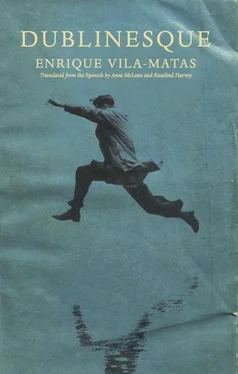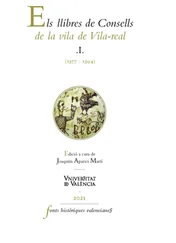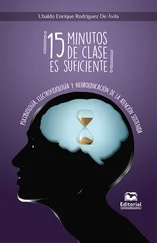On the other end of the line, his friend Javier is silent, but he can tell he’s still indignant. He’d be even more so if he knew his friend had mentally associated his diatribe against French cafés with his Asturian background.
Riba, to calm him down, changes the subject and talks about his growing interest in Dublin. Javier interrupts him and asks if he’s not timidly gravitating toward an English landscape. Or Irish, if he prefers. If he is, there’s no doubt he’s taking the first step toward the great betrayal.
The music now playing on the radio is Les Rita Mitsouko, “Le Petit Train.” The first step toward the great betrayal of everything French, shouts Javier enthusiastically. And Riba has no choice but to hold the telephone away from his ear. Javier is too excited. A betrayal of everything French? Is it possible to betray Rimbaud and Gracq?
It’s great you’ve gone over to England, Javier says just a few minutes later. And as he congratulates him for having taken the leap, he manages to surprise Riba.
What leap?
Javier says nearly everything in a highly unequivocal tone, totally convinced it can be no other way. It’s as if he’s talking about someone who’s swapped soccer teams. But Riba hasn’t taken any leap, nor has he gone over to England. Everything indicates that Javier would be pleased if he left French culture behind, maybe because he’s never had much contact with it and feels inferior in this respect. Maybe because he never stole anything in the Maspero bookshop, or because his father — this is not something easy to forget about Javier — was the anonymous author of the libelous article “Against the French” published in 1980 by a Valencian press: an amusing collection of swipes at the smugness of much of French culture and which began thus: “Their vanity was always their greatest talent.”
“It’d be good for you to lose some weight,” Javier says suddenly, “take the English leap. Get out of the Frenchified muddle you’ve been in for so long. Be lighter, more fun. Become English. Or Irish. Take the leap, my friend.”
Javier is methodical and sometimes categorical. But above all he’s stubborn, incredibly stubborn. He seems like he’s from Aragon in that way. Of course, you could probably say there are the same proportion of stubborn people in Aragon as anywhere else. Today, it seems, Javier is directing all his obstinacy against Riba’s French influence in his formative years. And he seems to be advising him to leave his Frenchification behind if he wants to get back his sense of humor and lose weight.
Riba timidly reminds him that, in the end, Paris is the capital of the Republic of Letters. And it still is, says Javier, but that’s exactly the problem, that culture has too much weight and can’t bear the slightest comparison to English liveliness. What’s more, the French don’t know how to communicate as well as the British nowadays. You just have to look at the phone booths in London and Paris. It’s not just that the English ones are much prettier, but they offer a comfortable and better designed space in which to actually talk, unlike the French ones, which are strange and designed for the outrageously pedantic aesthetics of silence.
Javier’s argument doesn’t convince him at all, among other things because there are hardly any phone booths left in Europe. But he doesn’t want to argue. He makes up his mind now to be agile and take a leap, a light English leap, to land on the other side , to start thinking about something else, to turn around, to move. And he ends up thinking to himself of some words of Julian Barnes’s, which seem very opportune at this moment: words where Barnes comments that the British have always been obsessed with France, as it represents for them the beginning of difference, the start of the exotic: “It’s curious: the English are obsessed with France while the French are merely intrigued by England.”
He remembers these words of Julian Barnes’s in Cross Channel and thinks that for him, on the other hand, it is precisely everything English that is the start of difference, the beginning of the exotic. New York intrigues him and when he thinks of this city he always remembers the words of his friend, the young writer Nietzky, who for years now has had a place there: “I live in the perfect city for dissolving your identity and reinventing yourself. Mobility’s hard in Spain: people pigeonhole you for life in the box where they think you belong.”
Deep down he’d like nothing more than to escape his pigeonhole of the prestigious retired publisher he’s been put in — quite firmly, it seems — by his colleagues and friends in Spain. Perhaps the time has come to take a step forward, to cross the bridge — in this case a metaphorical English Channel — that will lead him to other voices, other environments. Maybe it’d be a good idea to remove French culture from his life for a time: he’s so close to it now it almost disgusts him, and so it doesn’t even seem foreign anymore, but seems as familiar to him as Spanish culture, the very first culture he fled from.
Riba is starting to think that Englishness is where difference begins, where the exotic starts. It’s obvious that at the moment, only what is alien to his familiar world, only what is foreign, can draw him in a different direction. He knows he needs to venture into topographies where strangeness reigns and also the mystery and joy that surround the new: he needs to look at the world with enthusiasm again, as if seeing it for the first time. In short, to take the English leap, or something that looks like the leap that a moment ago, in such an eccentric, British fashion, Javier suggested to him.
A way to be even less Latin occurs to him: to stand in front of the mirror, to lose his instinct for melodrama and exaggeration and become a cold, dispassionate gentleman who doesn’t wave his arms around when he gives an opinion. And soon he hears the call of the difficult countries, the places and climates where no one — not even he — ever dreamed they would explore with such interest: places he imagined as inaccessible his whole life or, rather, took it for granted that, if only because of the language barrier, they would never be within his reach. He will look, once again, for the impossible. Nothing will be as good for him as to gravitate once more toward the foreign , because only then will he be able to get closer to the center of the world he’s looking for. A sentimental center, sought by the traveler from the Laurence Sterne book. He needs to be a sentimental traveler , to go to English-speaking countries, where he might regain the strangeness of things, where he might recover that whole special way of feeling he never found in the comfort of the intimately familiar: to see a wider range of possibilities opening up, of cultures, of strange signs to decipher. He needs to go to a place where he can regain the intense feeling of euphoria, to hear once more the voice of his grandfather Jacobo when he used to say nothing important was ever achieved without enthusiasm. He needs to take the English leap, although actually, he needs to leap in the opposite direction as that taken by Sterne’s sentimental traveler , who, being an Irish-born Englishman, left England precisely to take a leap that was French.
He knows that if he goes to Dublin, he’ll feel, just as he once felt in France, like an outsider again. The wonderful sensation of being from a different place. In Dublin he’ll be an outsider as Bloom was, and be able to travel once more through a place in which he won’t have the sensation of that disgusting closeness. Larkin wrote a poem called “The Importance of Elsewhere” that spoke of Ireland and that for a long time Riba liked a lot. He remembers it very well. In it the English poet spoke about how he wasn’t allowed to feel like an outsider in England, his own country. And he said that, when he was alone in Ireland, since it wasn’t his land, at least there he saw it was possible to be an outsider: “ The salt rebuff of speech , / Insisting so on difference, made me welcome : / Once that was recognized, we were in touch .” Larkin spoke of the draughty streets, end-on to hills. And of the faint archaic smell of the Irish docklands. And of the herring-hawker’s cry in the distance, making him feel separate but not overshadowed. “ Living in England has no such excuse: / These are my customs and establishments / It would be much more serious to refuse . / Here no elsewhere underwrites my existence .”
Читать дальше












